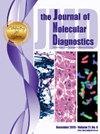Clinical Bioinformatician Body of Knowledge—Molecular Diagnostics Core
IF 3.4
3区 医学
Q1 PATHOLOGY
引用次数: 0
Abstract
Clinical bioinformaticians play a critical role in clinical molecular diagnostics laboratories as developers of data analysis pipelines, tools, and databases. They also contribute to a variety of other tasks, such as genomic data interpretation, database administration, hardware engineering, informatics, information technology, infrastructure support, and software engineering. To effectively perform these functions, the clinical bioinformaticians must possess a strong foundational knowledge of molecular biology, genetics, genomics, computational biology, and the relevant federal, state, and/or regional regulations, laboratory accreditation requirements, and other standards and best practices. This first article in the Association for Molecular Pathology's Clinical Bioinformatician Body of Knowledge series provides a comprehensive core knowledge base on molecular biology, genetics, genomics, clinical laboratory practices, sequencing technologies, databases, and clinical applications. This resource serves not only to equip clinical bioinformaticians for their professional roles but also as a valuable reference for laboratorians.
临床生物信息学家知识体系-分子诊断核心:分子病理学协会报告。
临床生物信息学家作为数据分析管道、工具和数据库的开发人员,在临床分子诊断实验室中发挥着关键作用。他们还为各种其他任务做出贡献,例如基因组数据解释、数据库管理、硬件工程、信息学、信息技术、基础设施支持和软件工程。为了有效地履行这些职能,临床生物信息学家必须具备分子生物学、遗传学、基因组学、计算生物学的强大基础知识,以及相关的联邦、州和/或地区法规、实验室认证要求和其他标准和最佳实践。这是分子病理学协会临床生物信息学家知识体系系列的第一篇文章,提供了关于分子生物学、遗传学、基因组学、临床实验室实践、测序技术、数据库和临床应用的全面核心知识库。该资源不仅为临床生物信息学家的专业角色提供了装备,而且为实验室人员提供了有价值的参考。
本文章由计算机程序翻译,如有差异,请以英文原文为准。
求助全文
约1分钟内获得全文
求助全文
来源期刊
CiteScore
8.10
自引率
2.40%
发文量
143
审稿时长
43 days
期刊介绍:
The Journal of Molecular Diagnostics, the official publication of the Association for Molecular Pathology (AMP), co-owned by the American Society for Investigative Pathology (ASIP), seeks to publish high quality original papers on scientific advances in the translation and validation of molecular discoveries in medicine into the clinical diagnostic setting, and the description and application of technological advances in the field of molecular diagnostic medicine. The editors welcome for review articles that contain: novel discoveries or clinicopathologic correlations including studies in oncology, infectious diseases, inherited diseases, predisposition to disease, clinical informatics, or the description of polymorphisms linked to disease states or normal variations; the application of diagnostic methodologies in clinical trials; or the development of new or improved molecular methods which may be applied to diagnosis or monitoring of disease or disease predisposition.

 求助内容:
求助内容: 应助结果提醒方式:
应助结果提醒方式:


